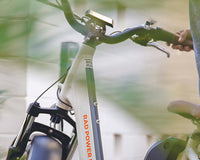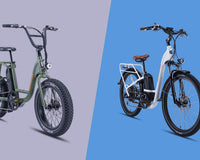Social distancing can be isolating, and seeing an onslaught of scary headlines and daunting COVID-19 facts and figures every day doesn't help allay feelings of anxiety or unease.
The slogan We’re all in this together doesn’t just mean we’re all taking similar steps to help stop the spread of coronavirus — it means we’re all struggling with the same feelings in these difficult times.
Like you, we can’t wait for things to go back to normal. Whether it’s celebrating a big life moment with your family, meeting up with a co-worker for long overdue drinks, or even just sharing a small, intimate hug with a friend, we desperately want to rediscover those little things we’ve all taken for granted.
Until then, there are a few things you can do to take care of yourself. As a Rad rider, that may be as simple as enjoying some time alone on your bike.
To that end, we’ve gathered some expert opinions on why those long, relaxing rides may matter now more than ever.
1. Your ride is better for you than you think.
 Ebikes are introducing more people to cycling. New studies suggest they're also opening up new ways for those riders to stay fit.
Ebikes are introducing more people to cycling. New studies suggest they're also opening up new ways for those riders to stay fit.
As an independent public health consultant and researcher at the University of Bristol, Dr. Nick Cavill has a long history of documenting the physical benefits of cycling.
But with the UK taking measures to stop the spread of coronavirus, Cavill has found that it's a perfect time to also focus on how a simple bike ride can boost your mental health.
"In a situation like this, where we're spending a lot of time indoors, cycling just gives you the chance to get fresh air," Cavill told us. "That means connecting with the environment, being outside, being in nature, having your mind away from your routine, away from the computer screen. Those are clear mental health benefits."
While physical activity, in general, has been shown to improve your mood, Cavill, an avid cyclist himself, suggested that riding a bike while observing rules of social distancing may bring unique benefits.
"Cycling seems to give something extra," he said. "It may not yet be very well researched, but it's fairly well known among cyclists. There's a feeling of freedom, the ability to choose your own route and go where you like, and the ability to get physically a long way from home in a short amount of exercise time compared to a run or walk ..."
"Maybe it's just a secret shared by cyclists," he added warmly.
Beyond personal well-being, Cavill is hopeful that the current moment could lead to better public health worldwide, especially if more people take this as an opportunity to switch from driving to cycling.
"We may see a shift to a society where there are fewer cars on the road, where short journeys are taken on foot, and longer or medium-sized journeys can be taken by bike. That’d be a society that has less congestion, fewer road traffic casualties, and, of course, improvements in carbon emissions," he said. "We're never going to get back to fully normal again after this, I fear, but maybe there might be some things that are slightly better."
2. Cycling's good for your wallet.
An ebike is one of the most cost-effective way to get around. We broke down the numbers to see how we stack up against the other transportation choices.
If you've been riding your bike during this crisis and have relied on a tune-up from your local bike shop to keep you safely on the road, you probably have the League of American Bicyclists to thank.
When businesses began to shutter, the advocacy group sprung into action to make sure that bike mechanics were recognized by the federal government as essential employees.
Ken McLeod, the League's Policy Director, told us that this was a necessary step to not just make sure that people had access to a healthy form of transportation, but also one that was economically viable.
"People use bicycles for utilitarian purposes," McLeod explained. "We're in a world where we just saw 10 million people going on unemployment. We know from data published by AAA that your car can cost thousands of dollars a year. There are a lot of people who might be hurting financially, and the bicycle is just an incredibly cheap, cost-effective, efficient way to get around."
"When we saw initial orders explicitly saying auto repair could stay open but were not given that same assurance for bicycle repair -- a much more resilient mode of transportation in times like these -- that that was an obvious thing that needed to be fixed."
Fun fact! We compared the costs of an ebike with those posed by cars, public transportation, and rideshares. In all instances, a bike emerged as a more affordable option.
3. It's the safe route.
 Maintaining social distance is key, but check out this guide to make sure your rides stay worry-free.
Maintaining social distance is key, but check out this guide to make sure your rides stay worry-free.
When cities began to fight the spread of COVID-19 by rolling back activities, cycling had a tendency to be specifically mentioned as one form of exercise that people could still enjoy.
“This does not mean you can’t go outside. If you feel like going for a walk, gardening, or going for a bike ride, we consider that essential activity for physical and mental health,” Washington Governor Jay Inslee said on March 24 while announcing a shelter in place order in his state. “We all just need to practice social distancing of 6 feet to protect ourselves and others -- everywhere, all the time.”
According to medical professionals across the globe, these were sound moves. Michael Barczok, a German pulmonologist, and Gerd Antes, a biostatistician with the Cochrane Center at Freiburg, Germany’s University Clinic, both told Der Speigel that cycling provides near “zero” risk of infection and is “perfect self-protection,” respectively.
Likewise, Dr. Kate Hattersley, a general practitioner aligned with the organization Cycling UK, told riders that cyclists who aren’t particularly vulnerable to coronavirus should be fine, especially if they follow proper precautions.
“There is no reason for you to stop cycling, as long as you maintain guidance on social distancing. That means avoiding unnecessary social contact, as well as keeping a safe distance (at least two meters) from other people,” Hattersley told Cycling UK. “Upon returning home, you must wash your hands. It’s also advisable to wash your cycling gloves, too. Remember to avoid touching your face if your hands are not clean.”
Just remember that local ordinances vary and to follow any guidance updates.









